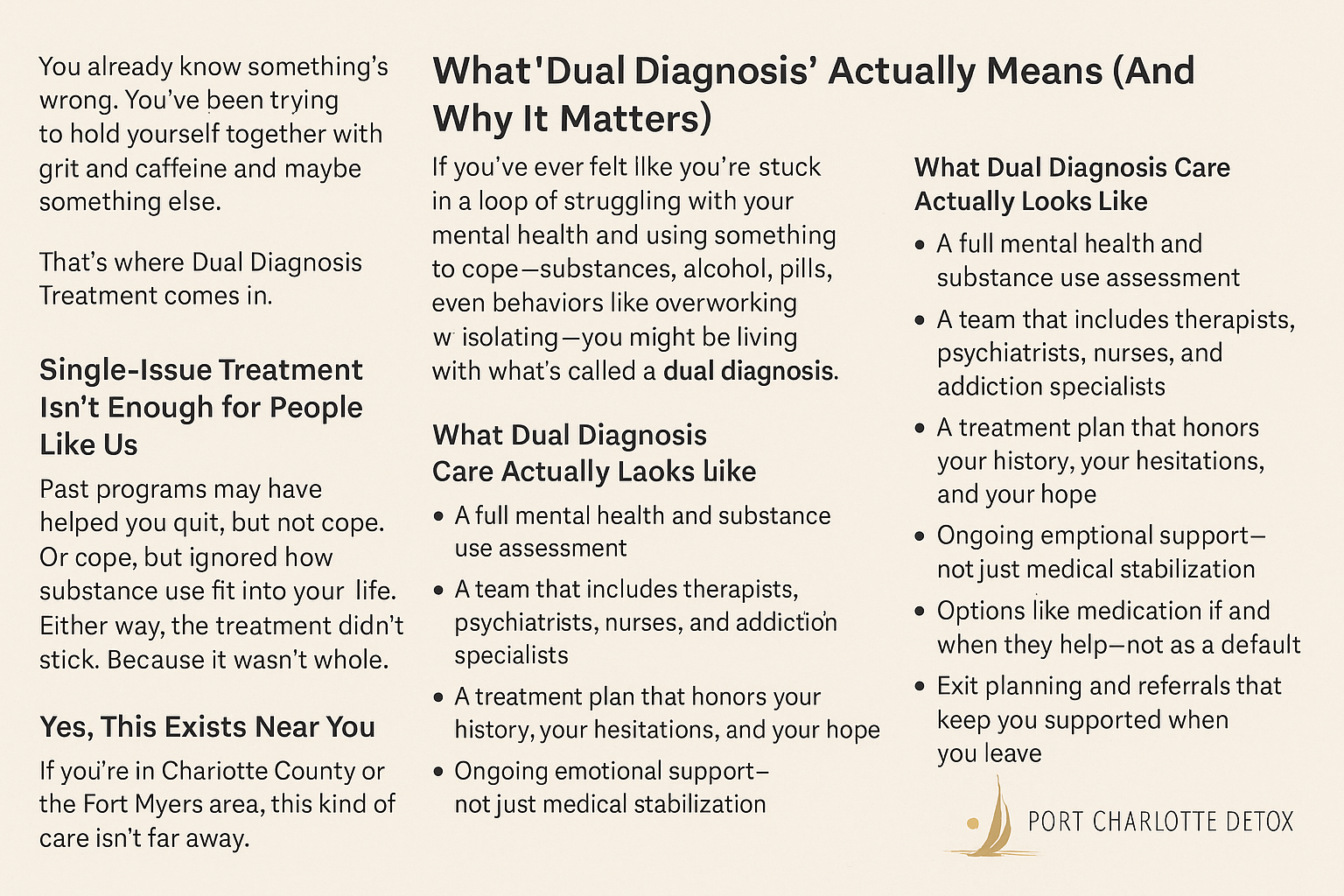You already know something’s wrong.
Not in the way someone else might say it. Not in the way a label might suggest. You know it in your bones—because you’ve been trying to hold yourself together with grit and caffeine and maybe a little too much of something else. You’re tired of pretending that the anxiety is manageable, that the depression is seasonal, that the way you use (or drink, or numb, or disappear) is “under control.”
This blog isn’t here to diagnose you. You’ve already seen enough search results and symptom quizzes for that. This is for the part of you that knows the answer—but hasn’t seen a real solution yet.
That’s where Dual Diagnosis Treatment comes in.
It’s not a trend. It’s not a fancy clinical term to make treatment sound more important. Dual diagnosis is the missing link that helps people actually get better—because it treats everything that’s going on, not just the visible parts.
What “Dual Diagnosis” Actually Means (And Why It Matters)
Let’s skip the jargon.
If you’ve ever felt like you’re stuck in a loop of struggling with your mental health and using something to cope—substances, alcohol, pills, even behaviors like overworking or isolating—you might be living with what’s called a dual diagnosis.
That just means this:
You’re not just dealing with substance use.
You’re not just dealing with anxiety, depression, PTSD, or bipolar disorder.
You’re dealing with both—and they’re tangled together.
You might not know which one came first. That’s okay. Real recovery doesn’t start by assigning blame. It starts by recognizing that healing one without the other rarely works.
Single-Issue Treatment Isn’t Enough for People Like Us
Maybe you’ve tried to get sober before. You went through detox, went to meetings, did your best to stay away from the thing that numbs you—but the emotions came back full force. Panic attacks. Crushing sadness. Sleepless nights. And eventually, you relapsed—not because you didn’t care, but because no one helped you deal with why you were using in the first place.
Or maybe you’ve been in therapy. Weekly sessions. Breathing exercises. Journals full of your hardest thoughts. But the drinking or the smoking or the late-night pills? They never got brought up. Not really. Maybe your therapist didn’t ask. Maybe you didn’t tell them.
Either way, the treatment didn’t stick.
Because it wasn’t whole.
Dual diagnosis treatment means nothing gets left behind. You don’t have to choose which version of you deserves help.
What Dual Diagnosis Care Actually Looks Like
At Port Charlotte Detox, our dual diagnosis program is built around one belief: You can’t recover in pieces.
That’s why every person who walks through our doors gets:
- A full mental health and substance use assessment
- A team that includes therapists, psychiatrists, nurses, and addiction specialists
- A treatment plan that honors your history, your hesitations, and your hope
- Ongoing emotional support—not just medical stabilization
- Options like medication if and when they help—not as a default
- Exit planning and referrals that keep you supported when you leave
You don’t have to be “ready” in the traditional sense. You just have to be willing to start.
What If You’ve Tried Before and It “Didn’t Work”?
You’re not the problem.
You might’ve been in a program that only focused on one piece of the puzzle. Maybe it helped you quit, but not cope. Maybe it treated your depression, but ignored the vodka. Maybe it labeled you with a diagnosis, gave you meds, and never asked what it felt like to live inside your life.
Dual diagnosis care is different.
It assumes your symptoms, behaviors, and choices are connected. It looks at your life through a lens of compassion and context, not punishment or performance.
If other treatments didn’t help, it might not be because you failed.
It might be because no one treated the whole you.
What Recovery Feels Like When You’re Finally Seen
When dual diagnosis care starts working, it doesn’t feel like fireworks.
It feels like relief.
You start to sleep a little better.
You cry—but the tears feel real, not hopeless.
You go a whole day without needing to numb out.
You remember things—good things. Things you used to care about.
You look in the mirror and see someone who’s trying.
And then one day, you realize… you’re proud. Not perfect. But proud.
Yes, This Exists Near You
If you’re in Charlotte County or the Fort Myers area, this kind of care isn’t far away. Port Charlotte Detox offers dual diagnosis treatment with real people who understand how trauma, addiction, and mental health interact.
We don’t force progress.
We don’t shame relapses.
We don’t ignore the hard questions.
We meet you where you are—and walk with you toward what’s next.
You’re Not Too Much. You’re Just Finally Being Understood.
If you’ve ever felt like no one can “handle” your story—too many symptoms, too many substances, too much mess—this is your reminder:
You were never too much. You were just in the wrong kind of care.
Dual diagnosis treatment was made for people like you.
People with big feelings and survival habits.
People who’ve been hurt and did what they had to do to keep going.
People who don’t want to die but don’t know how to live without something to take the edge off.
We see you. And we’re ready when you are.
FAQs About Dual Diagnosis Treatment
What’s the difference between dual diagnosis and regular addiction treatment?
Regular treatment often focuses on detoxing from substances or stopping use. Dual diagnosis treatment addresses both substance use and mental health conditions at the same time, because they’re often connected.
Do I have to take medication in dual diagnosis treatment?
No. Medication may be offered as one tool, but it’s always optional. You’re part of the conversation, and nothing is done without your understanding and consent.
What kinds of mental health issues does dual diagnosis treatment cover?
We support people with depression, anxiety, bipolar disorder, PTSD, trauma-related symptoms, and other conditions—especially when they coexist with substance use.
What if I’ve relapsed before? Will I still be accepted?
Absolutely. Relapse doesn’t disqualify you. It’s part of many people’s recovery story. We work with you from where you are, not where someone else says you “should” be.
Is this kind of treatment available in Port Charlotte or nearby?
Yes. Our dual diagnosis program in Charlotte County serves clients across Southwest Florida, including Fort Myers, Punta Gorda, and surrounding communities.
How long does treatment last?
It depends on your needs. Some people begin with detox and continue into longer-term care. Others do short-term stabilization before stepping down to outpatient or therapy-based support. We’ll help you build a plan that makes sense.
One Step Is Enough
You don’t need to map out your whole recovery right now. You don’t have to believe 100% that it will work. You just need enough courage to say: Maybe this is worth trying.
And if that’s where you are?
We’re here—ready to help, no judgment, no pressure.
Call (844)336-2690 to learn more about our Dual Diagnosis Treatment services in Port Charlotte, Florida.



